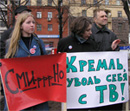Kremlin is obliging all political parties to give up their right to participate in Marches of Discontent. The President’s Administration forces political leaders to sign a special charter, undertaking free-will obligations not to collaborate with so-called “extremist” politicians and in particularly not to take part in oppositional rallies. (06-APR-07)
Text: HRH/Moscow, by Yanina Savenko. Sources: gazeta.ru, lenta.ru, demos-center.ru
The “Charter on counteraction to extremism” was written by officials of the President Administration, who have been negotiating with leaders of different political parties. Negotiations are kept in strict secret. Some political leaders don’t want to discuss details in the text, others say they even haven’t seen it and that only representatives of democratic parties and human rights activists are raising the alarm. The Movement “For Human Rights”, the Moscow Helsinki Group and other human rights organizations, including members of the Russian Research Center for Human Rights, appealed to politicians not to sign the document.
 Collection of signatures began long ago
Collection of signatures began long ago
Representatives of United the Russian Federation initiated a collection of signatures under the “Charter on counteraction to extremism” after a meeting of leaders of ten registered political parties with Vladimir Putin in December 2006. In January the text was sent to all parties and in February pro-Putin parties United the Russian Federation and Fair the Russian Federation signed it. In March the first Co-chairman of Yabloko party Sergey Ivanenko also signed the document.
Ban on social slogans
The Charter also bans participation in demonstrations and marches with “extremist slogans”. Furthermore, slogans of social discord will also be considered extreme. Then again, the notion of social discord is so wide and undefined that almost every social slogan against present policy can be equated to it. The President’s Administration claims that “social discord” was excluded from the latest version of the Charter. However, according to members of the Union of Right Forces party, the Administration has been forcing leaders of opposition parties to sign the Charter without showing them the final version of it.
Possibilities for abuse of power are innumerable
The parties are only allowed to accept and to support those candidates, who have publicly given up “extremist” activities. Meanwhile, according to the new law “On counteraction to extremist activities” almost every criticism against government officials and/or authorities may be considered extremist activity (extremism is a criminal offence in Russia). As a result, theoretically, an opposition activist, an independent journalist or a human rights activist can be easily accused of extremist activities.


